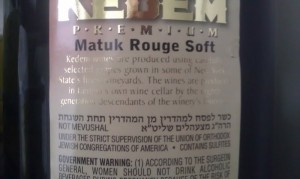The most well known halakhic implication of yayin mevushal is with regards to wine touched by non-Jews, otherwise known as “stam yeinam.” As Maimonides describes in Ma’achalot Assurot 11:3, if a non-Jew touched wine but one is uncertain if in doing so he designated it for idolatrous sacramental purposes, the wine is rabbinically forbidden. However, a common dispensation for this prohibition is if the wine was cooked, even if a non-Jew were to come into contact with the wine, the rabbinic prohibition would not apply for cooking the wine disqualifies it for sacramental use.
Space and time do not permit a complete analysis of the opinions regarding stam yeinam. However, the connection between cooked wine and its suitability for sacramental use is already found in M. Menachot 8:6.
משנה מנחות ח משנה ו
אין מביאין לא מתוק ולא מעושן ולא מבושל ואם הביא פסולM. Menachot 8:6
One may not bring sweet wine, or smoked wine, or cooked wine, and if one did so it is invalid.
Perhaps it is possible to assume that the same standards for a wine’s sacramental use are comparable for Jews and non-Jews, which would explain the application for stam yeinaim. However, the status of yayin mevushal also has implications for the Jewish ritual of Kiddush – sanctifying holy days.
B. Bava Batra 97a records an opinion that all wine for kiddush must be suitable to be used in the temple.
תלמוד בבלי בבא בתרא צז:א
אמר רב זוטרא בר טוביה אמר רב: אין אומרים קידוש היום אלא על היין הראוי לינסך על גבי המזבח.B. Bava Batra 97a
R. Zutra b. Tobiah said in the name of Rav: The Kiddush of the day must be proclaimed on such wine only as is fit to be brought as a drink offering upon the altar.
When we read this general qualification with the Mishna from Menachot cited above, we may conclude that the wine used for kiddush must not be mevushal, as Maimonides rules in Shabbat 29:14. However, as recorded in Shulhan Aruch O.C. 272:8, this specific requirement for only non-mevusal wine to be used for kiddush is disputed.
At any rate, the point of this post was simply to provide a very brief introduction to the implications of yayin mevushal. It appears to me that the very properties which make it advantageous for stam yeinam are exactly what makes yayin mevushal problematic for kiddush.
This post is intended as an introduction or explanation, not as a psak halakhah. However, I will say that my family tradition is in fact to only use non-mevushal wine where available. As a practical matter, those who are shopping for non-mevushal wines for kiddush may find specific brands or vintages which are non-mevushal, or as an alternative, many of Kedem wines are non-mevushal in the larger “magnum” sized bottles even if they are mevushal in the smaller ones.

You’re reminding me that I wrote a paper about wine when I was in school. I ought to dig that up and see if any part(s) of it is appropriate to be adapted into a blog post… :-)
Glad to help!
My understanding is that non-mevushal wine is considered unusable if it is poured by a non-Jew or by a Jew who is not shomer shabbat. Is that correct? What if some of the people around the seder table are not Shomer Shabbat? This is a particularly difficult problem since the custom is for each person to pour for another.
Nice post there although I didn’t have any idea what the real difference is between cooked wine, “yayin mevushal” and non mevushal wine. After I read your post, it gave me some details about their differences.